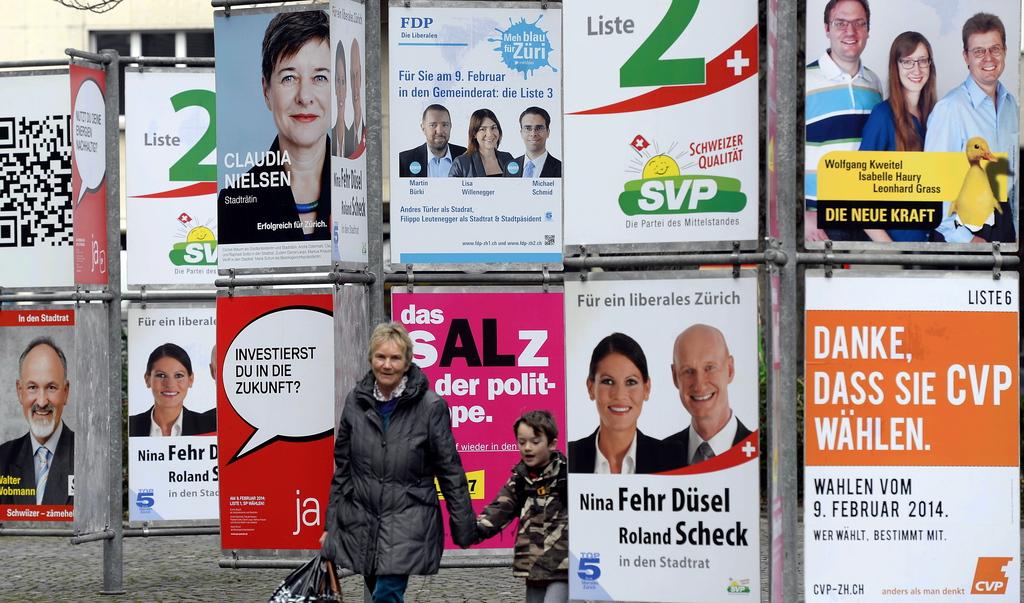Voters continue to gravitate towards the centre

With one year to go until the next election, immigration has once again proved to be the top issue. But according to the latest poll, this time the beneficiaries are not on the political right but in the centre. The left remains unchanged.
“For 20 years Swiss politics has been marked by a growing polarisation; now, however, we’re sensing a slight but steady move of votes towards the centre,” said Claude Longchamp, head of the GfS Bern research and polling institute which carried out the election barometer for the Swiss Broadcasting Corporation, swissinfo’s parent company.
The survey, released on Friday, confirms the trend seen in the previous election in 2011, which marked an end to the strengthening of the left and right to the detriment of the centre.
The biggest loser on Friday was the conservative right Swiss People’s Party. With a voter share of 24.6%, the party remains the country’s largest political force, but it has seen its share shrink by 2% since the previous election. Having peaked with 28.9% in the 2007 election, the People’s Party continues to lose support.
Parties on the left have maintained their electoral base from 2011. The Social Democratic Party has gained 1.4%, carrying it over the 20% mark, but at the expense of the Green Party, which lost 1.1%, bringing it down to 7.3%.
The most surprising result is the performance of two parties in the centre. The centre-right Radical Party’s unimpressive gain of 0.7% on 2011, giving it 15.8% of the vote, would, however, be the first time the party has stopped haemorrhaging votes since 1979.
The other eye-catching statistic is the 7.3% notched up by the centrist Liberal Greens, founded in 2007. The increase of 1.9% on the previous election means they are now level pegging with the Greens, who had been Switzerland’s undisputed largest environmental party since the 1980s.
The centrist Christian Democrats and the centre-right Conservative Democrats, both saw voter flight. The former lost 1.1%, according to Friday’s survey, continuing its long decline and putting it on 11.2%, half the figure of 30 years ago. The latter, which scored 5.4% in the 2011 elections, a couple of years after its founding, has dwindled by 0.6%.
Immigration vote
Among the issues considered most pressing by voters, immigration is clearly at the top: 53% of respondents said it was one of the two main problems which politicians needed to solve urgently.
It is followed by health insurance and health in general (19%), unemployment (16%) and social insurance (16%).
“The poll data are clearly influenced by the vote on February 9, when voters approved [by 50.3%] a People’s Party initiative to introduce quotas and curb immigration,” Longchamp said.
This violates the free movement of people within the EU, which non-EU Switzerland has signed up to via a series of bilateral accords.
“With its initiative, the People’s Party has once again succeeded in putting immigration, one of its favourite topics, at the centre of the political agenda. But this time it hasn’t benefited regarding public opinion – unlike it has often in the past,” Longchamp added.
“By endangering the bilateral accords with the EU, the People’s Party has gone too far in the eyes of a majority of voters.”
Bilateral accords
Three-quarters of respondents (73%) said the Swiss government should try to implement the immigration initiative and keep the bilateral accords at the same time – two issues the EU has said are incompatible.
In the event that this is not possible, 58% side with bilateral accords while 30% – just over the People’s Party’s share of the vote – would prefer to see the immigration initiative implemented. The remainder is undecided.
The majority of voters believe the bilateral accords should remain the pillar of Swiss policy on Europe. Just over half (54%) want Swiss-EU relations to be based on these agreements; 15% think this is the route to go even if Switzerland is forced to adhere to EU laws – as demanded by Brussels, which is pushing for a new institutional treaty.
Only 11% think isolation is the solution; 4% consider joining the EU a priority.
The issues of immigration and relations with Brussels have become two of the main areas of conflict in Swiss politics, say the survey’s authors. In an era of globalisation, the issue of openness to other countries is considered essential by a growing number of people.
Until now, in Switzerland, as in many other countries, this trend above all has favoured parties on the right. A right which, according to Longchamp, still has a large margin of mobilisation for the coming election. Until now only the left is thought to have already benefited from a fair level of mobilisation among its base.
The pollsters said the current data are not enough, however, to make a prediction on the outcome of the 2015 election.
They explained that on the one hand voter volatility had never been as high as in recent times, and on the other, election campaigns have in the past had the greatest influence on election results.
SBC poll
The pollsters interviewed 1,000 Swiss citizens from across the country between September 15-25.
Swiss expatriates were not included.
The survey was commissioned by the Swiss Broadcasting Corporation, swissinfo’s parent company, and carried out by the leading GfS Bern research and polling institute.
According to the authors, turnout for the 2015 election should be around 50%, average for previous elections.
Translated from Italian by Thomas Stephens

In compliance with the JTI standards
More: SWI swissinfo.ch certified by the Journalism Trust Initiative













You can find an overview of ongoing debates with our journalists here . Please join us!
If you want to start a conversation about a topic raised in this article or want to report factual errors, email us at english@swissinfo.ch.